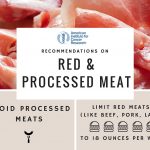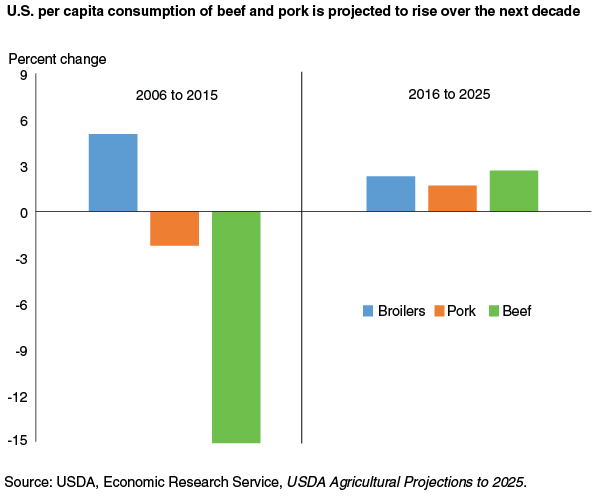A large new study of over half a million adults suggests that eating higher amounts of red and processed meat increases the chance of an earlier death from cancer and other causes, but replacing some of these meats with chicken, fish or other white meats lower the risk.
The study, published this week in The BMJ, adds to the evidence on how animal proteins affect our health.
For cancer risk, AICR research shows that high amounts of beef and other red meats increase risk of colorectal cancer. Even small portions of hot dogs, bacon and other processed meats eaten regularly increase the risk of both colorectal and stomach cancers.
In this BMJ paper, researchers used data from almost 537,000 participants of the National Institutes of Health (NIH)-AARP Diet and Health Study who were drawn from six states along with the Atlanta and Detroit areas. When participants entered the study, at ages 50-71, they answered questions about what and how much they ate over the past year, along with questions about other lifestyle habits.

After almost 16 years, the more red and processed meats people consumed the higher the chance of a premature death. This is after taking into account diabetes, heart disease, BMI, physical activity and other factors that play a risk in mortality.
Those in the highest category of white meat intake had a 25% reduction of dying from any cause compared with the lowest intake level. About a quarter of the white meat people were eating was fish.
The researchers then looked at certain compounds in red meat and processed meats that earlier studies have pointed to for their link to poorer health: heme iron, nitrates, and nitrites.
Heme iron is the compound that gives red meat its color, and some research suggests it may damage the lining of the colon. Nitrates and nitrites are added to some processed meats to preserve color and prevent spoilage. In lab studies, these compounds form cancer-causing substances.
After calculating the amount of these compounds people consumed, the study found that heme iron and processed meat’s nitrates/nitrites independently linked with increased risk of dying from cancer, along with heart disease and all causes.
This is an observational study, meaning that it does not show a direct cause that consuming red and processed meat link to earlier death. And the study relied on a single dietary assessment at the beginning of the follow-up, so people’s diets could have changed.
But it does build on the research on how meats affect health, coming at a time when red meat consumption is rising. A USDA report last year predicted lower prices will increase beef and pork consumption in the coming years.

For lower cancer risk, AICR recommends eating no more than 18 ounces of cooked red meat a week and avoiding processed meats.
Do you know what processed meat is? Take our quiz.
The study was supported by the Intramural Research Program in the Division of Cancer Epidemiology and Genetics, the US National Institutes of Health, National Cancer Institute.





